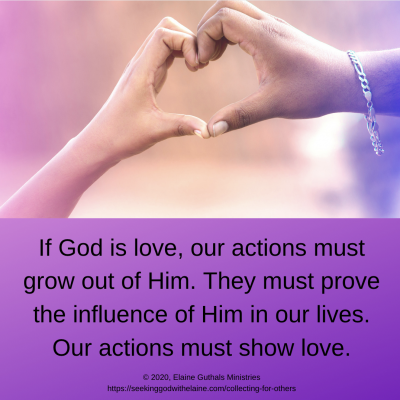God calls disciples to be generous when other disciples are in need. This devotion looks at a collection taken for the Jerusalem church that Paul used the Macedonian Church as an example for the Corinthian Church.
Nuggets
- We learn by example.
- Paul and Barnabas for the able ones to give to the needy ones.
- The disciples in Macedonia were having a difficult time, but they took up a collection for other disciples.
- The Corinthians, according to Paul, had everything.
- A disciple gives mainly based on God’s grace.
- We are to love our fellow disciples because God is love.
- The best example we have is Jesus.

We as disciples are called to support each other. Sometimes, that will be monetary support.
Paul used the Macedonian Church as an example to the Corinthian Church. Let’s see what we can learn from this example.
Let's Put It into Context #1
The Merriam-Webster Dictionary defines cooperation as “the actions of someone who is being helpful by doing what is wanted or asked for” and “association of persons for common benefit.”
Resource
Let's Put It into Context #2
Macedonia was a province north of Greece. It reads like it was a part of Greece at one time. Bible History said that “Alexander the Great (King of Macedonia) conquered the Persian empire.”
Resource
Because of this, Arnold said there was desolation and distress in that province. This was due to civil wars, wars with other countries, and other miseries.
Resource
Raising Money
“We want you to know, brothers and sisters, about the grace of God that was given to the churches of Macedonia: During a severe trial brought about by affliction, their abundant joy and their extreme poverty overflowed in a wealth of generosity on their part. I can testify that, according to their ability and even beyond their ability, of their own accord, they begged us earnestly for the privilege of sharing in the ministry to the saints, and not just as we had hoped. Instead, they gave themselves first to the Lord and then to us by God’s will. So we urged Titus that just as he had begun, so he should also complete among you this act of grace” (II Cor. 8: 1-6 CSB)
We learn by example. Paul used the churches in Macedonia as an example.
Look again at what Paul said these disciples did. “During a severe trial brought about by affliction, their abundant joy and their extreme poverty overflowed in a wealth of generosity on their part” (II Cor. 8: 2 CSB).
The disciples in Macedonia were having a difficult time. They were undergoing a severe trial and were expiring extreme poverty.
Now, the worldview today would be saying that a collection needed to be taken to ease their poverty and persecution. A Save the Macedonians campaign would be launched.
Nope. The Macedonians took up a collection for other disciples — disciples they probably hadn’t even met. The disciples in the Jerusalem church were experiencing an extreme famine.
Paul and Barnabas were the organizers of the collection. They called for the able ones to give to the needy ones. Burrell told us if the various places within the Scriptures where this call and collection took place:
- Acts 2: 27-30
- Romans 15: 26
- I Corinthians 16: 1
- Romans 15: 27
Resource
What Paul was teaching the Corinthians was unity — cooperativeness.
Why did the Macedonians do this? They did it because of their liberality.
We’ve talked about that word before, back in our What Is Charity? series. Liberality means generosity.
Devotions in the What Is Charity? series
Generosity has several elements to it.
- It is voluntary given.
- It is given at amount more than what would be expected, even to point a point of self-denial.
- It is done based on the giver’s beliefs.
- It is done as an act of fellowship.
- It is personal.
A disciple gives mainly based on God’s grace. Grace is a free and unmerited gift from Heavenly Father given through His Son, Jesus Christ that enables salvation and spiritual healing to believers. Because God gave so freely and abundantly to us, we give to others.
We look at it through the lens of stewardship. Stewardship is managing all resources resources God has given us for the purpose of expanding His kingdom.
Devotions in the Stewardship category
We look at it as, if God has generously provided it to us, we should generously give it back — either directly to His church or to another of His disciples.
But I want to pounce on the fellowship aspect a second. Foster wrote, “Fellowship is an interflow of hearts and a cooperation with others.”
Resource
We said cooperation was doing something to help someone else. We do it generously when we do it with liberality.
But did you see what Paul said? Their contribution exceeded expectations.
Remember when Jesus made the comment on the widow’s offering (Mk. 12: 41-44). He said, “They all gave out of their wealth; but she, out of her poverty, put in everything — all she had to live on” (Mk. 12: 44 NIV). What He was saying was that the amount wasn’t what was the defining factor. It was the sacrifice.
But You
“Now as you excel in everything — in faith, speech, knowledge, and in all diligence, and in your love for us — excel also in this act of grace. 8 I am not saying this as a command. Rather, by means of the diligence of others, I am testing the genuineness of your love” (II Cor. 8: 7-8 CSB)
The Corinthians, according to Paul, had everything — “… faith, speech, knowledge, and in all diligence, and in your love for us …” (II Cor. 8: 7 CSB). They had what the Macedonians did not.
Paul wanted them to excel in one other thing. “… excel also in this act of grace” (II Cor. 8: 7 CSB).
Moir gave us three reasons why offerings have been occurring since the time of Cain and Abel.
- We depend on God.
- We are obliged to God.
- It promotes spiritual welfare.
Resource
All of this is built on the concept of love. We are to love our fellow disciples because God is love. We are to imitate His character.
What was the old saying? Love isn’t love until you give it away.
One of the sermons I read brought up a good point. How could our religion be real if love was not the essence?
Resource
If God is love, our actions must grow out of Him. They must prove the influence of Him in our lives. Our actions must show love.

But Jesus
“For you know the grace of our Lord Jesus Christ: Though he was rich, for your sake he became poor, so that by his poverty you might become rich. 10 And in this matter I am giving advice because it is profitable for you, who began last year not only to do something but also to want to do it. 11 Now also finish the task, so that just as there was an eager desire, there may also be a completion, according to what you have” (II Cor. 8: 9-11 CSB)Bible Verse
The best example we have is Jesus. He gave up Heaven and came to earth to be born into poverty.
“Adopt the same attitude as that of Christ Jesus, who, existing in the form of God, did not consider equality with God as something to be exploited. Instead he emptied himself by assuming the form of a servant, taking on the likeness of humanity. And when he had come as a man, he humbled himself by becoming obedient to the point of death — even to death on a cross” (Phil. 2: 5-8 CSB).
No, Jesus didn’t give money. He gave Himself instead.
Remember, back in verse 7, we talked about the Corinthians having knowledge. Clemance detailed four areas where we gain knowledge of Christ’s grace.
- “The infinite love of God (Rom. 5: 8).
- “The value of man in the eye of Heaven.
- “The Divine consecration of self-sacrifice.
- “The Divine lever by which God would lift the world.”
Resource
But being generous doesn’t mean anything until we take the necessary actions.
Denney made a good point. In today’s vernacular, we would say Pay It Forward would be taking place.
Yes, the Jerusalem church was benefiting right now. But they would be expected to pitch in during the next collection. Denney wrote, “Brotherhood cannot be one-sided; it must be mutual, and in the interchange of services equality is the result.”
Resource
This is one of the ways we could interpret “And all the believers met together in one place and shared everything they had” (Ac. 2: 44 NLT).
Making the Connections
Disciples have to be giving. Bolland wrote, “Failing to see that liberality is a grace, we have made it a burden. As a grace in the heart, liberality struggles for an outlet in acts of benevolence; as a duty or a burden, it needs to be urged.”
Resource
If disciples aren’t giving, they will probably be labeled as selfish. We really don’t get ahead that way, though. God will not reward that. Burrell wrote, “The rule of holy loving is never selfishness, but always self-forgetfulness.”
Resource
I love what Spurgeon told us. He wrote, “The great works of the world are not done by the great people of the world; but as the tiny coral insects, patiently working unseen, produce large results, it often happens that the weakest brethren bestow large blessings.”
Resource
Think back on inventors, scientists, etc. They probably had a lot of failures before they hit their success. That means they probably weren’t a household name — at first.
We aren’t called to be successful. We are called to be faithful.

If we look at how God set up his church, we see that He set it up based on giving. The Great Commission says, “Therefore go and make disciples of all nations, baptizing them in the name of the Father and of the Son and of the Holy Spirit, and teaching them to obey everything I have commanded you. And surely I am with you always, to the very end of the age” (Mt. 28: 19-20 NIV). We give by
- Going
- Making
- Baptizing
- Teaching
It is going to take time, money, skill, reputation, perseverance — I bet we could list more.
Making the Connections to Self-Discipline
This world previously had programmed us to the Me First mentality. I think this generation has done much to counteract that.
However, they are not being generous for God’s purposes. Unfortunately, some may think their generosity is enough.
Unless they ABCDed, their generosity won’t be enough. What will you say when someone you are witnessing to raises this issue.
We’ve been looking at defending our beliefs when we are witnessing. That means we have to be secure enough to convince someone to accept our beliefs.
Our questions should still serve us to determine on what we need to focus.
- What does the Scriptures say?
- What do I believe?
- Why do I believe the same/differently than the Scriptures?
- What are the talking points when witnessing to a non-believer?
Related Links
I have created a worksheet of the questions above. Click on the button below to access it.
How Do We Apply This?
- We have to dedicate ourselves to God, which will lead us to be more giving.
- We need to surrender all we have and all we are to Him to use as He sees fit.
- We choose to have a cheerful attitude toward giving.
- We need to imitate Jesus.
- We should find the areas in our church where there are needs and try to meet those needs as God directs.
God calls us to love and support fellow disciples. In doing that, we are supporting His mission.
Father. You have given us so much. Help us to share what You have given us with others so that we can support Your ministry. Amen.
What do you think?
Leave me a comment below (about this or anything else) or head over to my Facebook group for some interactive discussion.
If you don’t understand something and would like further clarification, please contact me.
If you have not signed up for the email daily or weekly providing the link to the devotions and the newsletter, do so below.
If God has used this devotion to speak with you, consider sharing it on social media.